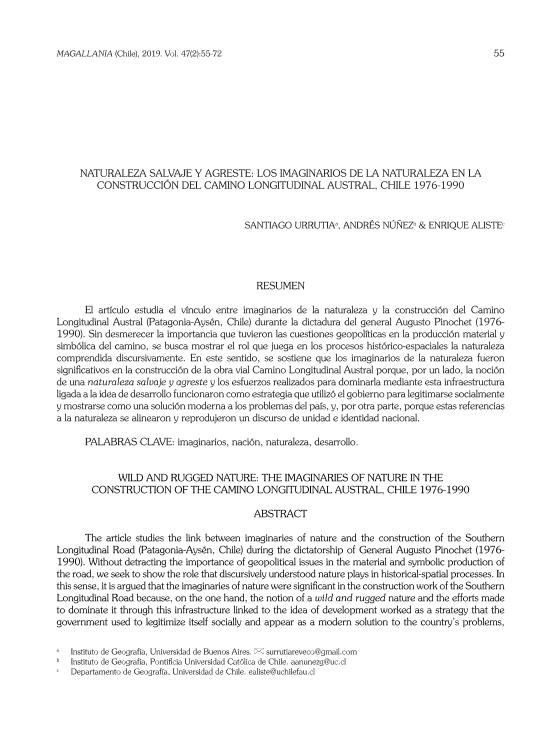Mostrar el registro sencillo del ítem
dc.contributor.author
Urrutia Reveco, Santiago José

dc.contributor.author
Núñez, Andrés
dc.contributor.author
Aliste, Enrique
dc.date.available
2022-07-08T17:50:18Z
dc.date.issued
2019-12
dc.identifier.citation
Urrutia Reveco, Santiago José; Núñez, Andrés; Aliste, Enrique; Naturaleza salvaje y agreste: Los imaginarios de la naturaleza en la construcción del camino longitudinal Austral, Chile 1976-1990; Universidad de Magallanes. Instituto de la Patagonia. Centro de Estudios del Hombre Austral; Magallania; 47; 2; 12-2019; 55-72
dc.identifier.issn
0718-0209
dc.identifier.uri
http://hdl.handle.net/11336/161764
dc.description.abstract
El artículo estudia el vínculo entre imaginarios de la naturaleza y la construcción del Camino Longitudinal Austral (Patagonia-Aysén, Chile) durante la dictadura del general Augusto Pinochet (1976- 1990). Sin desmerecer la importancia que tuvieron las cuestiones geopolíticas en la producción material y simbólica del camino, se busca mostrar el rol que juega en los procesos histórico-espaciales la naturaleza comprendida discursivamente. En este sentido, se sostiene que los imaginarios de la naturaleza fueron significativos en la construcción de la obra vial Camino Longitudinal Austral porque, por un lado, la noción de una naturaleza salvaje y agreste y los esfuerzos realizados para dominarla mediante esta infraestructura ligada a la idea de desarrollo funcionaron como estrategia que utilizó el gobierno para legitimarse socialmente y mostrarse como una solución moderna a los problemas del país, y, por otra parte, porque estas referencias a la naturaleza se alinearon y reprodujeron un discurso de unidad e identidad nacional.
dc.description.abstract
The article studies the link between imaginaries of nature and the construction of the Southern Longitudinal Road (Patagonia-Aysén, Chile) during the dictatorship of General Augusto Pinochet (1976- 1990). Without detracting the importance of geopolitical issues in the material and symbolic production of the road, we seek to show the role that discursively understood nature plays in historical-spatial processes. In this sense, it is argued that the imaginaries of nature were significant in the construction work of the Southern Longitudinal Road because, on the one hand, the notion of a wild and rugged nature and the efforts made to dominate it through this infrastructure linked to the idea of development worked as a strategy that the government used to legitimize itself socially and appear as a modern solution to the country’s problems, and, on the other hand, because these references to nature were aligned and reproduced a discourse of unity and national identity.
dc.format
application/pdf
dc.language.iso
spa
dc.publisher
Universidad de Magallanes. Instituto de la Patagonia. Centro de Estudios del Hombre Austral
dc.rights
info:eu-repo/semantics/openAccess
dc.rights.uri
https://creativecommons.org/licenses/by-nc/2.5/ar/
dc.subject
Imaginarios
dc.subject
Nación
dc.subject
Patagonia
dc.subject
Naturaleza
dc.subject.classification
Geografía Cultural y Económica

dc.subject.classification
Geografía Económica y Social

dc.subject.classification
CIENCIAS SOCIALES

dc.title
Naturaleza salvaje y agreste: Los imaginarios de la naturaleza en la construcción del camino longitudinal Austral, Chile 1976-1990
dc.title
Wild and rugged nature: The imaginaries of nature in the construction of the camino longitudinal Austral, Chile 1976-1990
dc.type
info:eu-repo/semantics/article
dc.type
info:ar-repo/semantics/artículo
dc.type
info:eu-repo/semantics/publishedVersion
dc.date.updated
2022-07-07T13:39:26Z
dc.identifier.eissn
0718-2244
dc.journal.volume
47
dc.journal.number
2
dc.journal.pagination
55-72
dc.journal.pais
Chile

dc.journal.ciudad
Punta Arenas
dc.description.fil
Fil: Urrutia Reveco, Santiago José. Consejo Nacional de Investigaciones Científicas y Técnicas; Argentina. Universidad de Buenos Aires. Facultad de Filosofía y Letras. Instituto de Geografía "Romualdo Ardissone"; Argentina
dc.description.fil
Fil: Núñez, Andrés. Pontificia Universidad Católica de Chile; Chile
dc.description.fil
Fil: Aliste, Enrique. Universidad de Chile; Chile
dc.journal.title
Magallania
dc.relation.alternativeid
info:eu-repo/semantics/altIdentifier/url/http://magallania.cl/index.php/magallania/article/view/1149
dc.relation.alternativeid
info:eu-repo/semantics/altIdentifier/doi/http://dx.doi.org/10.4067/S0718-22442019000200055
Archivos asociados
